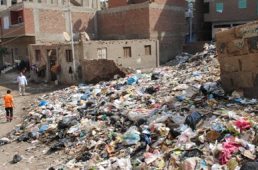Diarrhoea
 Diarrhoeal disease is aggravated by poor hygiene. Photo credit: WHODiarrhoeal disease is the second leading cause of death in children under five years old and is responsible for killing 1.5 million children every year. Diarrhoea is the passage of three or more loose or liquid stools per day, or more frequently than is normal for the individual. Infection is spread through contaminated food or drinking-water, or from person-to-person as a result of poor hygiene. Diarrhoeal disease is treatable with a solution of clean water, sugar and salt, and with zinc tablets.
Diarrhoeal disease is aggravated by poor hygiene. Photo credit: WHODiarrhoeal disease is the second leading cause of death in children under five years old and is responsible for killing 1.5 million children every year. Diarrhoea is the passage of three or more loose or liquid stools per day, or more frequently than is normal for the individual. Infection is spread through contaminated food or drinking-water, or from person-to-person as a result of poor hygiene. Diarrhoeal disease is treatable with a solution of clean water, sugar and salt, and with zinc tablets.
Diarrhoea can last several days and can leave the body without the water and salts that are necessary for survival. Most people who die from diarrhoea actually die from severe dehydration and fluid loss. Children who are malnourished or have impaired immunity are most at risk of life-threatening diarrhoea.
The wide diversity of bacterial and viral infections that may cause diarrhoea complicates accurate surveillance and diagnosis, especially in developing countries with little or no access to modern laboratory procedures. The specific disease burden attributable to a particular infectious agent is particularly complex, given the multiplicity of these agents, their serotypes, and its accurate documentation depends largely on laboratory facilities.
Information resources
Recent publications
Diarrhoea: Why children are still dying and what can be done
Combating waterborne disease at the household level | French
WHO technical notes on drinking-water, sanitation and hygiene in emergencies
Policy documents
Implementing the new recommendations on the clinical management of diarrhoea
Links
Global foodborne infections network
Programme on food and waterborne diseases and zoonoses
Training Programmes in Epidemiology and Public Health Interventions Network (TEPHINET)








